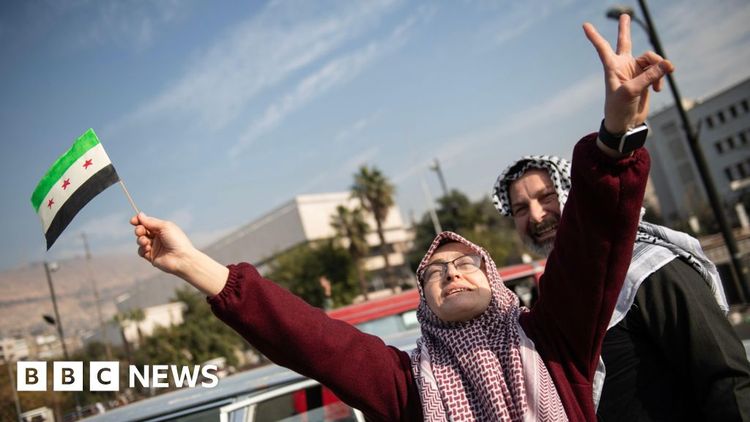Syria: Rebels seize Damascus as Assad flees capital

Rebel fighters have captured the Syrian capital of Damascus, effectively toppling the Assad regime that has been in power in the country since 1971.
Forces led by opposition group Hayat Tahrir al-Sham (HTS) entered the city in the early hours of Sunday morning, before appearing on state television to declare Syria to now be "free".
The whereabouts of Bashar al-Assad, the nation's erstwhile president, are unknown. He is believed to have fled the capital on a plane.
The rebels - who made a lightning advance over the past fortnight, taking key cities on the road to Damascus - were greeted with celebrations in the streets as they entered the city.
"We all feel like we have been underwater literally for 13 years and we just took a breath," Rania Kataf, a 39-year-old researcher in Syrian cultural heritage in Damascus, told the BBC.
"Overwhelmed is not even a word [that can describe this]."
Another resident said: "For the very first time, there is a true feeling of freedom."
Ahead of the rebel takeover, though, others expressed uncertainty about the future, fearing instability and violence in a city that had been relatively unscathed by Syria's decade-long civil war.
Assad had been in power since 2000, when he assumed the presidency from his father, Hafez. The regime was marked by repression, censorship and human rights violations.
Following the Arab Spring, a number of factions opposed to Assad formed - among them HTS, which was established in 2011 as an affiliate of al-Qaeda and had early involvement from the leader of Islamic State. It is still proscribed a terrorist group by the UN, the US and others.
The leader of the Islamist group, Abu Mohammed al-Jawlani, has attempted to reform its image, breaking with al-Qaeda and pledging tolerance for Syria's minorities.
Many of HTS's statements in the past few days have cast it as a movement for all Syrians, while Jawlani told CNN on Friday: "No one has the right to erase another group. These sects have coexisted in this region for hundreds of years, and no one has the right to eliminate them."
In the last fortnight, HTS launched a surprise offensive from the north, quickly seizing the cities of Aleppo and Hama.
Its progress in the face of limited government resistance also sparked an uprising by allied rebels in the southern region of Daraa, who pushed towards Damascus from the south.
On Saturday night, HTS retook the strategically important city of Homs as government forces retreated, freeing more than 3,500 prisoners from a military prison there.
Despite claims from the interior ministry that there was a "very strong" military cordon around Damascus, a few hours later it was in rebel hands.
There have been early signs of an orchestrated transition of power that largely avoids violence.
Syria's Prime Minister Mohammed Ghazi al-Jalali said that he remains in Damascus and had been in contact with HTS's leadership.
HTS said it was "strictly forbidden" for rebels to attack public institutions, which would remain under Jalali's supervision until formally handed over.
But with the common cause of Syria's rebel factions now achieved, there remains a risk that the country could go the way of Libya and descend into years of competing armed factions and instability.
As for Assad, Jalali told Al-Arabiya that he had last heard from him on Saturday evening, and had no information about his whereabouts.
Russia - a long-term ally of Assad - said he had left his post as president and fled the country as a result of negotiations with "other participants in the armed conflict".
But there has been speculation that a plane thought to be carrying the deposed leader had been shot down, after flight tracking data suggested it made an abrupt U-turn before disappearing off the map.















































